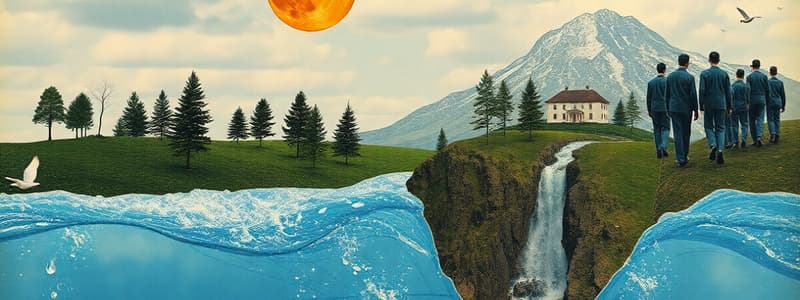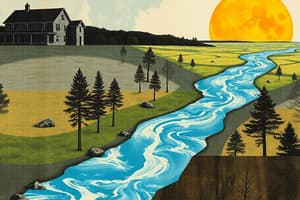Podcast
Questions and Answers
What is a drainage basin?
What is a drainage basin?
- The end of a river
- The point where two rivers meet
- A term for water storage in clouds
- An area where water collects and drains into a common outlet (correct)
What is a tributary?
What is a tributary?
A smaller stream that flows into a larger river
What is confluence in a river context?
What is confluence in a river context?
The point where two rivers meet
What is the mouth of a river?
What is the mouth of a river?
Define watershed.
Define watershed.
What is interception in the context of hydrology?
What is interception in the context of hydrology?
What does infiltration refer to?
What does infiltration refer to?
What is surface run-off?
What is surface run-off?
Define throughflow.
Define throughflow.
What is erosion?
What is erosion?
What does source refer to in a river context?
What does source refer to in a river context?
Define transpiration.
Define transpiration.
What is evaporation?
What is evaporation?
Define transportation in hydrology.
Define transportation in hydrology.
What is deposition?
What is deposition?
What are interlocking spurs?
What are interlocking spurs?
Define waterfall.
Define waterfall.
What is a gorge?
What is a gorge?
Flashcards are hidden until you start studying
Study Notes
Drainage Basin
- An area of land where precipitation collects and drains into a common outlet like rivers, lakes, or oceans.
- Serves as a natural funnel, directing water flow through tributaries and into larger water bodies.
Tributary
- A smaller stream or river that flows into a larger river.
- Contributes additional water, sediment, and nutrients to the main river system.
Confluence
- The point where two or more rivers meet and combine their flow.
- Often marks significant changes in flow characteristics and sediment transport.
Mouth
- The location where a river joins a larger body of water (e.g., ocean, sea, lake).
- Typically characterized by wider, more complex ecosystems and sediment deposition.
Watershed
- A region that drains into a specific water body, encompassing one or more drainage basins.
- Plays a crucial role in managing water resources and ecological health.
Interception
- The process where precipitation is caught by vegetation before it reaches the ground.
- Helps reduce surface runoff and enhances soil moisture.
Infiltration
- The process by which water enters the soil from the surface.
- Influences groundwater recharge and soil moisture availability.
Surface run-off
- Water that flows over the land's surface, usually due to precipitation exceeding soil absorption.
- Can lead to erosion and transport of sediments and pollutants to water bodies.
Throughflow
- The lateral movement of water through the soil layer.
- Plays a role in maintaining soil moisture and affecting water availability.
Erosion
- The wearing away of land surfaces, primarily caused by water, wind, or ice.
- Leads to sediment transport and can shape landscapes over time.
Source
- The origin point of a river or stream, often found in mountainous or elevated areas.
- Typically characterized by spring waters or melting glaciers.
Transpiration
- The process through which plants release water vapor into the atmosphere from their leaves.
- Contributes to the water cycle and local climate regulation.
Evaporation
- The transformation of water from liquid to vapor, occurring primarily from bodies of water.
- Essential for the water cycle; increases with temperature and wind.
Transportation
- The movement of sediments and dissolved materials by water within a river system.
- Influenced by water speed and sediment particle size.
Deposition
- The process where sediments settle out of the water and accumulate, forming new landforms.
- Typically occurs in areas where water velocity decreases, such as river deltas and floodplains.
Interlocking spurs
- Protrusions of land that alternate on either side of a river valley, creating a zigzag pattern.
- Formed through river erosion and the process of down-cutting.
Waterfall
- A natural feature where water cascades over a vertical drop or cliff.
- Often creates a plunge pool at the base due to the force of falling water.
Gorge
- A narrow valley with steep rocky walls, formed by river erosion.
- Typically represents a deep cut through rock or land caused by a river's prolonged activity over time.
Studying That Suits You
Use AI to generate personalized quizzes and flashcards to suit your learning preferences.




